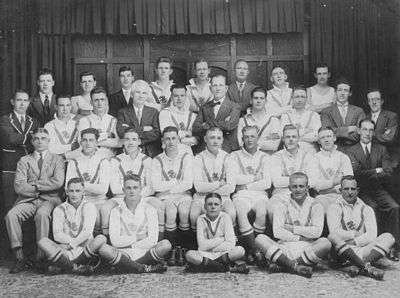Harry Flower
Harold Edwin 'Harry' Flower (30 October 1900 − 6 September 1970) was an Australian WWII veteran, a prisoner of war and a 1920s rugby league player in the New South Wales premiership competition with St. George.

Personal information | ||||||||||||||||||||||||||||||||||||||||||||||||||
|---|---|---|---|---|---|---|---|---|---|---|---|---|---|---|---|---|---|---|---|---|---|---|---|---|---|---|---|---|---|---|---|---|---|---|---|---|---|---|---|---|---|---|---|---|---|---|---|---|---|---|
| Full name | Harold Edwin Flower | |||||||||||||||||||||||||||||||||||||||||||||||||
| Born | 30 October 1900[1] Sydney, New South Wales, Australia | |||||||||||||||||||||||||||||||||||||||||||||||||
| Died | 6 September 1970 (aged 69) Beverly Hills, New South Wales, Australia | |||||||||||||||||||||||||||||||||||||||||||||||||
Playing information | ||||||||||||||||||||||||||||||||||||||||||||||||||
| Position | Lock, Second-row, Prop | |||||||||||||||||||||||||||||||||||||||||||||||||
| ||||||||||||||||||||||||||||||||||||||||||||||||||
Source: [2] | ||||||||||||||||||||||||||||||||||||||||||||||||||
Background
Flower was born in Newtown, New South Wales on 30 October 1900.
Playing career
Flower learnt to play rugby league at a young age and was also a great runner, running marathons with the Redfern and St. George Harriers clubs.[3] Originally a South Sydney junior and prop-forward, Flower played eight seasons with St. George during their foundation years between 1922 and 1930.
He scored a try in the infamous Earl Park Riot match in 1928. His last game was the 1930 Grand Final against Western Suburbs.[4]
His brother Jim Flower also played with the St. George Dragons.
War service
Flower enlisted in the Australian Army as a 40-year-old during World War II and attained the rank of lance corporal.[5] He was captured and held by the Japanese as a prisoner of war, and survived. His 19-year-old son (Harry Edwin Flower junior) also served in the Australian Army and survived the war.
Death
Flower died on 6 September 1970, 54 days short of his 70th birthday.[6]
References
- WWII roll
- "Harry Flower - Career Stats & Summary - Rugby League Project". Rugbyleagueproject.org.
- The Referee, Sydney "harry Flower Still Blooms" 13/1/1932
- Alan Whiticker/Glen Hudson: Encyclopedia of Rugby League Players. 1995 -- ISBN 1875169571
- Flower's WWII Roll
- Sydney Morning Herald- Death Notice 7/9/1970